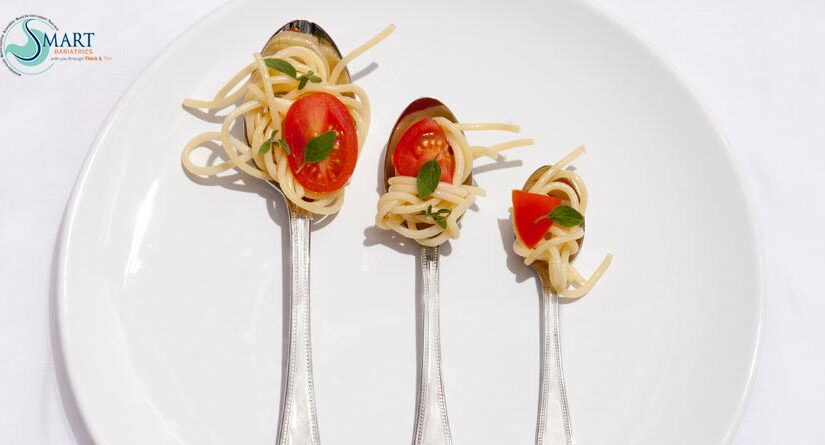Bariatric surgery is a life-saving procedure, helping you lose weight, reduce co-morbidities, improve quality of life, look better and feel confident. Though long term success calls for certain dietary and lifestyle changes and consistent follow-up with your surgeon and bariatric dietician. We understand that change is difficult, mainly for those who have spent years of their lives without a healthy relationship with food. To achieve your post-surgery nutritional targets you need to have realistic goals and plan in place.
Bariatric surgery alters the way your stomach handles food by creating restriction, malabsorption, or a combined effect, this allows you to eat less quantity and calories over time.
After surgery, your diet progresses from liquid to soft then normal diet. Immediate after surgery your portion size and calorie intake could be really small, though it will change as the months go on and this is perfectly normal. One should be more focused on the quality of foods rather than the quantity. The focus should be on promoting a lifelong change and healthy habits because the quantity is restricted, make sure the food must be nutritious.
Calorie intake for the first week after surgery is approximately 400 to 600 Kcal/day. As your diet will advance from liquid to pureed then soft foods before introducing solids food, your calorie intake would range between 600-800 kcal/day, and you should target for 60-80 grams of protein per day. Several months after surgery, one should consume 1200 to 1500 Kcal/day, and continue taking 60-80 grams of protein each day. Meeting protein goals through natural sources is difficult, especially for vegetarians or vegans, that’s why including a high protein, bariatric friendly supplement is necessary.
Given below are helpful tips to stay on the track:
- Eat small and frequent meals- Try to include 3 main meals along with 2 to 3 high protein snacks to fulfil your nutritional needs.
- Choose protein first- Since you are eating less food, ensure to choose a good source of protein over carb in each meal (eggs, lean meats, poultry, fish, beans, or low-fat dairy foods) to try getting 60g/day.
- Eat slowly.Post-surgery every meal should last 20-30 minutes. If you eat at your earlier pace or too fast, you may overeat and may experience nausea, vomiting, and/or pain or pressure in the shoulder or upper chest.
- Introduce new foods gradually – Try introducing one new food at a time, so you can understand which foods you can tolerate.
- Avoid 5 ‘S’- 5 ‘S’ stands for Sugar, Spirits, Soda, Straw and Smoking, all these should be restricted in the post-surgery diet to prevent associated side-effects, such as, excess calorie intake, bloating and anastomotic ulcers, respectively.
Meeting your calories goals and dietary behaviour may seem difficult at first, though you will be much comfortable as long as you follow and listen to your surgeon and the dietician’s advice. Please remember everyone’s journey is different, so don’t compare your challenges, goals and success with anyone. Focus on your aim, take a small step each day, and make good habits for long term success!!






